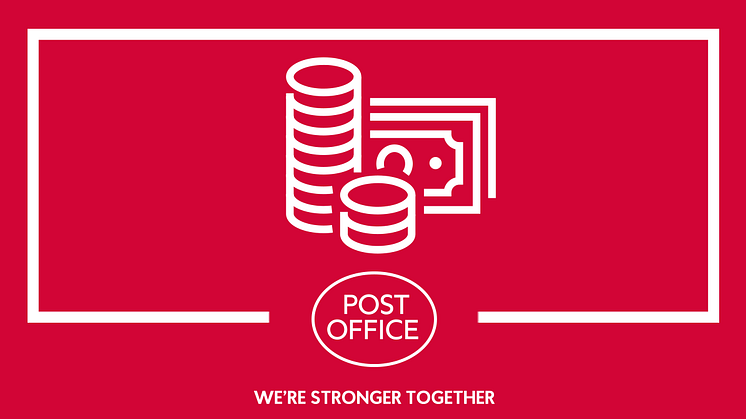
News -
New figures show Scotland’s communities and businesses increasingly supported by Post Offices amid bank branch closures
- Use of Post Offices to deposit and withdraw cash has soared in Scotland over the past two years, up 11% year on year
- The Post Office believes demand has been driven by bank branch closures and rising awareness of Post Offices’ availability to bank customers, opening hours and other benefits
- Cash plays a vital role in local economies and communities, and especially for small businesses and vulnerable members of society, meaning Post Offices play a ‘lifeline’ role
- Figures come as Post Office Banking Director gives evidence today to Scottish Affairs Committee about Access to Cash in Scotland and role Post Office plays in guaranteeing that
The Post Office today publishes figures for Scotland showing the organisation’s fast-growing and vital role supporting local communities and economies with cash handling services – amid sharp falls in the numbers of bank branches.
Post Offices can be used by personal and business customers of [30] banks, building societies and credit unions to deposit and withdraw cash, deposit cheques and check balances.
In 2021, total cash deposits and withdrawals by business and personal customers at Scotland’s 1300 Post Offices rose to a total of [£2.41bn], up 11% per cent compared with [£2.18] bn in 2020. A fuller breakdown is in the table in the table below.
2020 | 2021 | % Change | |
Personal withdrawals | £545,846,828 | £593,082,999 | 8.65% |
Personal deposits | £779,185,023 | £965,059,248 | 23.86% |
Business withdrawals | £17,077,346 | £17,202,460 | 0.73% |
Business deposits | £835,949,801 | £837,624,426 | 0.20% |
Total | £2,178,058,998 | £2,412,969,133 | 10.79% |
In addition, the total number of transactions (deposits and withdrawals) hit 11 million in 2021, compared with 10.7 million in 2020.
Today’s figures coincide with the next Scottish Affairs Committee evidence session on Access to Cash in Scotland in which the Post Office’s Banking Director, Martin Kearsley, will give evidence.
The Post Office believes the sharp increase reflects closures of bank branches across Scotland. Which?, the consumer advocacy group, earlier this month told the Scottish Affairs Committee in Westminster that the number of bank branches in Scotland had fallen by 53% over the past seven years – with 1,040 branches having been closed.
There is also growing awareness of the other benefits of using Post Offices to do everyday banking. Because many are located in convenience stores, they often have longer opening hours than traditional bank branches and customers can pick up groceries and pay bills at the same time.
In addition, communities appreciate the crucial role that Post Offices play in local economies, where cash transactions can be critical for small businesses, and where many individuals, and especially more vulnerable members of society, rely on cash. Postmasters frequently handle deposits and withdrawals to the penny, reflecting customers’ careful budgeting.
In Scotland, the data also shows that average personal deposit in 2021 was £324.83, and the average withdrawal was £85.34. For business customers, the average deposit was £1063.02, and the average withdrawal was £226.05.
Last week the Post Office announced it had secured a new agreement to continue to handle cash deposits and withdrawals across the UK on behalf of the banks, building societies and credit unions for a further three years – ensuring a continued ‘lifeline’ for the millions of people and small businesses nationwide that rely on cash. The new agreement, Banking Framework 3, will run from 1 January 2023 to 31 December 2025.
Martin Kearsley, the Post Office’s Banking Director, said: “Post Offices increasingly provide a lifeline for individuals and small businesses across Scotland, especially amid ongoing bank branch closures. Although many people use cash less, it remains crucial for large numbers of people and local economies.
“When we see customers making withdrawals, we are often seeing people whose budgeting is so tight, they need to withdraw cash to the nearest penny. You also have to consider businesses that rely on cash, and just what the impact would be if they had to turn such custom away – they need a convenient and secure place to pay that cash in speedily without having to close to visit a distant bank branch. It can make a critical difference to a local economy.
“The good news is that Post Offices continue to provide cash services across Scotland. What’s more, they very often have longer opening hours as most are located in convenience stores. This also means you can pick up groceries or pay bills at the same time.”.”
Post Office is also trialling new Banking Hubs whereby five major banks (RBS, Santander, Virgin Money, Bank of Scotland, TSB) take it in turns to provide services on weekdays as part of a landmark industry commitment to protect cash and banking services across the UK. One of the two established hubs is located in Cambuslang, South Lanarkshire, providing access to face-to-face banking services for its community of 25,000. As a result of the overwhelmingly positive response, it was announced both pilots would continue to run until spring 2023, at least. In addition, a Bank Hub will be opened this year in Carnoustie (Angus).



